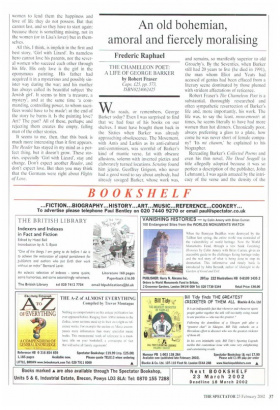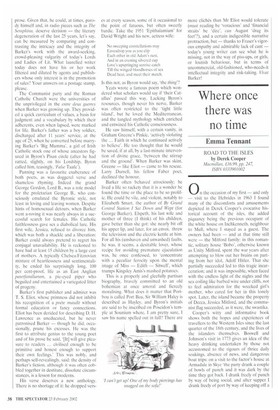An old bohemian, amoral and fiercely moralising
Frederic Raphael
THE CHAMELEON POET: A LIFE OF GEORGE BARKER by Robert Fraser
Cape, £25, pp. 573, ISBN0224062425
ho reads, or remembers, George Barker today? Even I was surprised to find that we had four of his books on our shelves. I must have bought them back in the Sixties when Barker was already approaching obsolescence. The Movement, with Amis and Larkin as its anti-cultural anti-commissars, was scornful of Barker's kind of mantic verse, fat with obscure allusions, solemn with inverted pieties and elaborately turned locutions. Scrutiny found him jejune. Geoffrey Grigson, who never had a good word to say about anybody, had already savaged Barker, whose work was,
and remains, so manifestly superior to old Grouchy's. By the Seventies, when Barker still had 20 years to live (he died in 1991), the man whom Eliot and Yeats had accused of genius had been effaced from a literary scene dominated by those plumed with strident affectations of reticence.
Robert Fraser's The Chameleon Poet is a substantial, thoroughly researched and often sympathetic resurrection of Barker's life and, more importantly, his work. The life was, to say the least, mouvernente: at times, he seems literally to have had more women than hot dinners. Chronically poor. always preferring a glass to a plate, how come he was never short of female company? 'Its mi chavvm,' he explained to his biographer.
Rereading Barker's Collected Poems and even his thin novel, The Dead Seagull (a title allegedly adopted because it was so perfect a description of the publisher, John Lehmann), I was again amazed by the intricacy of the verse and the density of the prose. Given that, he could, at times, parody himself and, in radio pieces such as The Seraphinu, deserve derision — the literary degeneration of the last 25 years, let's say, can be measured by comparing and contrasting the intricacy and the integrity of Barker's work with the award-seeking, crowd-pleasing vulgarity of today's Lords and Ladies of Lit. What laurelled writer today does not have his or her work filtered and diluted by agents and publishers whose only interest is in the promotion of sales? Your answers on a postage stamp, please.
The Communist party and the Roman Catholic Church were the universities of the unprivileged in the entre dens guerres when Barker was growing up. They provided a quick curriculum of values, a basis for judgment and a vocabulary by which their adherents, even when lapsed, were marked for life. Barker's father was a boy soldier, discharged after 11 years' service, at the age of 25, when he converted before marrying Barker's 'Big Mumma', a girl of Irish Catholic stock one of whose ancestors figured in Byron's Pisan circle (after he had ratted, slightly, on his Lordship, Byron called him, teasingly, `False Taafe').
Punning was a favourite exuberance of both poets, as was doggerel verse and shameless rhyming. Indeed the grand George Gordon, Lord B., was a role model for the proletarian George B., who consciously emulated the Byronic style, not least in loving and leaving women. Despite hints of homosexual detours, when Barker went a-roving it was nearly always in a successful search for females. His Catholic faithlessness gave sex a diabolical lure. His first wife, Jessica, refused to divorce him, which was both a shackle and a liberation: Barker could always pretend to regret his conjugal unavailability. He is reckoned to have had at least 15 children by a large cast of mothers. A typically Chelsea/Fitzrovian mixture of heartlessness and sentimentality, he ended his surprisingly long, 100 per cent-proof, life as an East Anglian paterfa milia rum, a pie-eyed piper who beguiled and entertained a variegated litter of progeny.
Barker's first publisher and admirer was T. S. Eliot, whose primness did not inhibit his recognition of a poete maudit without formal education or fancy connections. Eliot has been derided for describing D. H. Lawrence as uneducated, but he never patronised Barker — though he did, occasionally, prune his excesses. He was the first to attribute genius to the young poet and of his prose he said, '[It] will give pleasure to readers ... civilised enough to be primitive and honest enough to support their own feelings.' This was nobly, and perhaps self-revealingly, said: the density of Barker's fiction, although it was often cobbled together in destitute, dissolute circumstances, is a lesson for moderns.
His verse deserves a new anthology. There is no shortage of it: he dropped vers es at every season, some of it occasional to the point of fatuous, but often sweetly bardic. Take the 1951 'Epithalamium' for David Wright and his new, actress wife:
No sweeping constellations may Eavesdrop you as you clip Each other in old Adam's nest. And in an evening silvered cup Love's upspringing sunrise catch Till the winged bloodhorses of sex Dead heat, and meet their match.
Is this not, as Byron would say, 'the thing'?
Yeats wrote a famous poem which wondered what scholars would say if 'their Catullus' passed this way. Lacking Byron's resources, though never his nerve, Barker was often restricted to the 'tight little island', but he loved the Mediterranean, and the tangled mythology which enriched and entwined his Catholic consciousness.
He saw himself, with a certain vanity, in Graham Greene's Pinkie, 'actively violating the ... Faith in which he continued actively to believe'. He too thought that he would be saved, if at all, by a last-minute intervention of divine grace, 'between the stirrup and the ground'. When Barker was skint, Greene — like Eliot — came to his rescue. Larry Durrell, his fellow Faber poet, declined the honour.
Barker often behaved atrociously; he lived a life so rackety that it is a wonder he found the time or the place to be so prolific. He could be vile, and violent, notably to Elizabeth Smart, the author of By Grand Central Station I Sat Down and Wept (for George Barker). Elspeth, his last wife and mother of three (I think) of his children, gave better than she got: she nearly bit off his upper lip, and later, for an envoi, threw the television and the electric kettle at him. For all his (unshaven and unwashed) faults, he was, it seems, a desirable lover, whose recipe for avoiding premature ejaculation was, he once confessed, to 'concentrate with a peculiar ferocity upon the mental image of Miss — Edith — Sitwell', which trumps Kingsley Amis's mashed potatoes.
This is a properly and gleefully partisan biography, bravely committed to an old bohemian at once amoral and fiercely moralising. What does it matter that Portbou is called Port Bau, Sir William Haley is described as Hayley, and Byron's initials are said to be inscribed on Poseidon's temple at Sounium where, I am pretty sure, I saw his name spelled out in full? There are
more clichés than Mr Eliot would tolerate (must reading be 'voracious' and 'financial straits' be 'dire', can August 'drag its feet'?), and a certain indigestible narrative protraction, but — thanks to Fraser's vigorous empathy and admirable lack of cant — today's young writer can see what he is missing, not in the way of piss-ups, or girls, or loutish behaviour, but in terms of uncommercial, old-fashioned, who-needs-it intellectual integrity and risk-taking. Vivat Barker!







































































 Previous page
Previous page